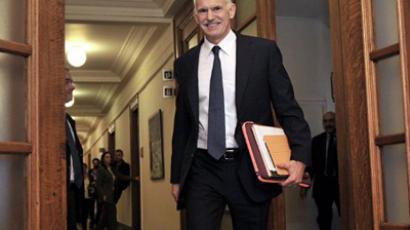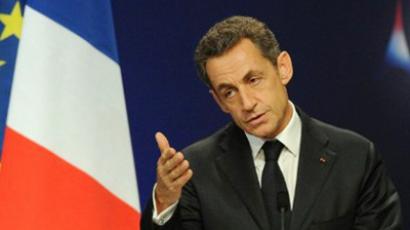Greek wait-a-bit: New PM to be announced
Greece heads the line of countries destabilizing the Eurozone and in Athens a new coalition 'unity' government has been formed to tackle the debt crisis. This comes after weeks of political chaos that has put Greek membership of the Euro in jeopardy.
Prime Minister George Papandreou has agreed to step down, with his replacement due to be announced imminently. The new interim government will lead the country until new elections, expected to be held in February next year.Economics analyst Nick Skrekas told RT that whoever will be appointed as the new Greek Prime Minister, he or she will not be able to improve the situation greatly. “He or she can make it at least sustainable until we can go to elections and elect a new government, which is probably going to be a coalition as well,” he maintained. “Let’s face it – over the weekend just about every Greek was holding his breath hoping that this deal will be reached, and it wasn’t until the late hours of yesterday that we had confirmation of it. Without it, we would have lost funding and we would have faced an economic implosion within a few months and possibly a messy Eurozone exit,” Skrekas added.He also pointed out that the political system is not doing everything it can and it is about time the political system became a little bit more responsible and responsive to the needs of the country.“I think a coalition should have been formed quite a while ago. It seemed that a lot of the opposition parties were voting for the money, but never for the austerity,” he explained.Politicians have only just got the message people have been trying to convey in the last couple of weeks, Skrekas told RT.“They had to sit down and hammer out some sort of agreement for the country to be able to progress and at least not lose the funding, at least not lose that opportunity,” Skrekas stated.With the word "contagion" on everyone's lips, Skrekas believes Italy and Spain are probably still the largest threats to the eurozone and Italy the political situation in Italy is even more unstable than it is in Greece.“I think there are very many good reasons to worry about other countries and even countries like France that may well lose its triple-A rating at some point in the future,” he said.According to Skrekas, it is time to face the unpalatable truth and abolish the euro project that some say was flawed from the start. However, it is not quite as simple as abolishing it overnight, and one can’t really do that in any simple situation. “What they have to do of course other than bailing out some countries and putting up some defenses in the short term is have a really good look at the infrastructure of the whole project and see if there is some reform that can make it more workable. Of course when you have 17 very different economies in very different countries, setting one uniform monetary policy is always going to be haphazard. And when the ECB itself can’t lend to countries, then things can be very problematic,” he concluded.














